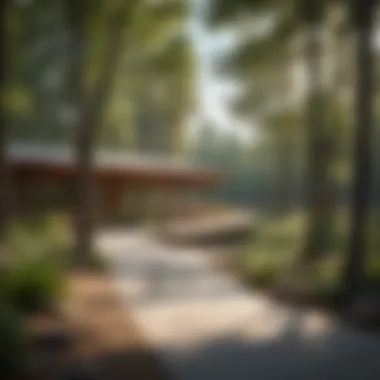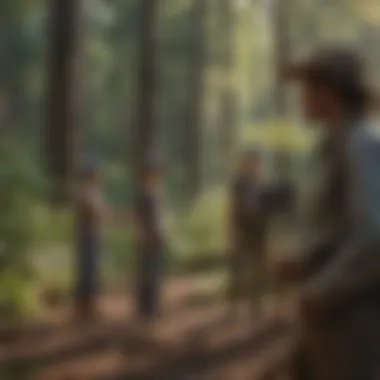Exploring the Whitewater Equestrian Center: A Comprehensive Overview


Intro
The Whitewater Equestrian Center stands out as a venue that intertwines equestrian pursuits with a deep connection to nature. Here, visitors can explore an environment crafted to foster both riding skills and environmental education. This guide seeks to provide an in-depth overview of the center, including its unique features, programs, and the broader implications for sustainable practices.
Evergreen Trees Species
While primarily focused on equestrian activities, the Whitewater Equestrian Center is situated in a region rich with evergreen trees. These trees, essential to American forests, play a role in the local ecosystem, enhancing the aesthetic and environmental value of the center.
- Types of Evergreen Trees: Various species thrive in the area, including Eastern White Pine, Douglas Fir, and Red Cedar. Each species has adapted uniquely to the local conditions, contributing to a diverse ecosystem.
- Ecological Significance: Evergreens are vital for maintaining biodiversity. They provide habitats for wildlife, help in soil conservation, and play a significant role in carbon storage. Their year-round foliage offers consistent shelter for birds and small mammals.
- Conservation Practices: Protecting these trees is crucial. Sustainable forestry practices, reforestation efforts, and community engagement contribute to their preservation. Initiatives to educate visitors about the importance of evergreen species are also part of the center’s mission.
Forest Management Techniques
Effective management of forest resources is paramount to ecological balance. At the Whitewater Equestrian Center, various strategies are employed to safeguard the surrounding woodlands.
- Wildlife Habitat Preservation: Strategies focus on maintaining thriving habitats by controlling invasive species and ensuring that native flora and fauna can flourish. This creates a sanctuary for diverse wildlife.
- Sustainable Logging Practices: The center adopts responsible timber practices. This ensures that any logging activity does not compromise the overall health of the forest. Only selective logging is performed, allowing the ecosystem to remain largely intact.
- Fire Prevention Measures: Fire management strategies are integral to protecting woodland areas. These include creating firebreaks and conducting controlled burns to minimize the risk of uncontrolled wildfires.
- Ecosystem Restoration Initiatives: Projects aimed at restoring damaged ecosystems are essential. This involves replanting native species and repairing trails that may have negatively impacted the land.
Climate Change Impact on Evergreen Forests
Climate change poses significant challenges to evergreen forests, affecting their health and biodiversity.
- Carbon Sequestration: Forests play a critical role in mitigating climate change by capturing carbon dioxide. Evergreen trees, due to their longevity, contribute substantially to this process.
- Weather Pattern Effects: Alterations in climate lead to changes in precipitation and temperature levels, subsequently affecting tree growth and health. Understanding these shifts is essential for effective management.
- Biodiversity Support: As climates change, the struggle for survival among various species intensifies. Species that cannot adapt quickly face extinction, impacting overall forest biodiversity.
- Localized Effects: Different regions experience unique effects from climate change. Communities and ecosystems may react differently, necessitating dedicated research to assess specific impacts in the local area.
Management and Preservation of Evergreen Forests
Understanding the historical context and modern practices in managing evergreen forests shapes conservation efforts.
- Historical Context: American evergreen forests have a rich history. Indigenous practices once oriented around sustainable land use have much to teach about current conservation needs.
- Research Findings: Ongoing research studies provide insights on best practices for sustainable forest management and biodiversity improvement. These findings can guide the practices at the Whitewater Equestrian Center.
- Conservation Efforts Showcase: Various organizations and local initiatives work to protect evergreen forests. Success stories often highlight effective community engagement and partnerships in conservation efforts.
Outdoor Activities in Evergreen Forests
The landscapes surrounding the center offer activities that enhance the appreciation of both nature and sustainable practices.
- Hiking Trails Exploration: The area features well-maintained trails suitable for all skill levels. These trails offer the opportunity to experience the beauty of evergreen forests up close.
- Camping Destinations: For those looking to immerse themselves in nature, designated camping spots are available. These sites provide a serene setting among towering evergreens.
- Nature Photography Opportunities: The scenic landscapes present an ideal canvas for photography enthusiasts. The interplay of light and greenery makes for captivating images.
- Birdwatching Enthusiasts: The region is home to various bird species, attracting birdwatchers. Observing these species in their natural habitat adds another dimension to the outdoor experience.
By exploring the interconnectedness of equestrian activities and forest conservation, the Whitewater Equestrian Center offers a unique perspective on sustainable practices in outdoor recreation.
Intro to the Whitewater Equestrian Center
The Whitewater Equestrian Center serves as a focal point for those interested in equestrian activities. This center provides a unique blend of experiences that connect horse riding with a respect for nature. The facility is not just about riding; it encompasses a mission to promote equestrian education and environmental stewardship.
The importance of understanding the center's function and environment cannot be overstated. It lays the groundwork for appreciating the various programs and services available. Additionally, it offers insight into how the center positions itself as a leader in sustainable practices. Factors such as its design, location, and accessibility contribute to its effectiveness as a learning hub and a recreational venue.
Purpose and Mission
The primary purpose of the Whitewater Equestrian Center is to foster a profound connection between individuals and horses. It aims to provide a comprehensive educational experience for riders of all ages and skill levels. This commitment to education is evident in their structured riding lessons, workshops, and community-focused events.
The mission goes beyond just horse riding. The center also emphasizes the importance of environmental conservation. It strives to educate its visitors not only about riding techniques but also about sustainable practices. By integrating these values, the Whitewater Equestrian Center becomes a resource that enriches both human and equine lives, promoting a culture of respect for nature.
Location and Accessibility
The Whitewater Equestrian Center is strategically located to serve a wide audience. Its position near significant urban centers yet nestled in a natural setting makes it accessible to a broad demographic. Visitors can reach the site via multiple transportation options, including local public transit and personal vehicles, ensuring convenient access for everyone.


The layout within the center is designed to accommodate various activities while maintaining a welcoming atmosphere. Ample parking space is available, and the pathways through the facility are clearly marked, making it easy for visitors to navigate.
Overall, the location of the Whitewater Equestrian Center is both practical and thoughtfully considered. This accessibility enhances its role as a pivotal establishment in the realm of equestrian activities and environmental education.
Facility Overview
The Facility Overview serves as a crucial component of understanding the Whitewater Equestrian Center. This section highlights not only the physical characteristics of the facility but also its functional aspects that contribute to the overall experience of visitors and participants alike.
Architectural Design
The architectural design of the Whitewater Equestrian Center reflects its mission to merge functionality with environmental aesthetics. The design features are well thought out to accommodate both equestrians and guests. This means that spacious stables are paired with inviting communal areas. The materials used for construction prioritize durability and sustainability, ensuring that the facility remains resilient against the elements while supporting eco-friendly initiatives. Large windows provide ample natural light, creating a welcoming environment.
Moreover, the center integrates smart design principles. This includes effective drainage systems to manage rainwater run-off and strategically placed visitor pathways that respect the natural landscape. Future enhancements may revolve around adaptive management of space, further bridging human activity with nature.
Equestrian Arenas and Trails
Equestrian arenas and trails at Whitewater Equestrian Center are thoughtfully designed to cater to a range of disciplines, from dressage to jumping, while also including therapeutic riding areas. The primary arena is a standout showcase, with advanced footing that provides excellent traction for both horse and rider. This enhances performance and also prioritizes safety.
The outdoor trails weave through the surrounding woods, offering scenic views and natural challenges for riders of all skill levels. These trails are meticulously maintained to ensure they are safe and accessible year-round. Featuring a mix of terrain, riders can experience various landscapes, which aids in skill development and enjoyment.
"Quality facilities enhance learning and create inspirational experiences—a must for any equestrian center."
Understanding these features is essential for assessing how the facility supports both equestrian activities and environmental consciousness.
Programs and Services
The Whitewater Equestrian Center is not just a place for riding; it serves as an educational hub offering a diverse array of programs and services. These programs cater to various interests and skill levels while promoting a strong connection between humans and horses. They encompass a holistic approach, integrating equine welfare with environmental education. This aspect is crucial as it addresses the needs of both aspiring equestrians and the broader community.
Riding Lessons for All Ages
At the Whitewater Equestrian Center, riding lessons are tailored for learners of all ages. The programs are divided into different skill levels, allowing beginners to feel comfortable while more advanced riders can hone their skills. This inclusivity creates a welcoming environment that encourages participation. Lessons focus on fundamental techniques as well as safety measures, ensuring that riders develop both competence and confidence.
"The foundation of riding is not only about technique but also about building a bond with the animal."
Instructors at the center are experienced and passionate about teaching. They employ various teaching methods, including ground handling, to enhance understanding of horse behavior. Group lessons allow participants to learn from each other, fostering a communal atmosphere where knowledge is shared.
Therapeutic Riding Programs
The center is also home to therapeutic riding programs designed to assist individuals with disabilities. These programs leverage the unique properties of horses to support physical, emotional, and cognitive development. Participants experience numerous benefits such as improved balance, strength, and social skills.
Therapeutic sessions are customized, ensuring that each participant receives the appropriate level of support. Highly trained staff and volunteers guide riders, focusing on creating a safe and nurturing environment. The impact of such programs transcends physical improvement, enriching participants' overall well-being and self-esteem.
Equine Training Workshops
In addition to riding instruction, the Whitewater Equestrian Center offers equine training workshops. These workshops are designed for those interested in understanding horse behavior and training techniques. Participants gain insights into effective methodologies while developing skills that enhance their interactions with horses.
Workshops cover essential topics, including:
- Groundwork and Obstacle Navigation
- Communication Techniques with Horses
- Understanding Horse Psychology
Engaging in these workshops helps build trust between riders and horses, making for a safer riding experience. The center emphasizes the importance of ethical horse handling as part of its commitment to equine welfare. By participating in these training opportunities, individuals cultivate a deeper appreciation for the intelligence and sensitivity of horses.
In summary, the programs and services at the Whitewater Equestrian Center are designed to empower individuals through the art of riding. They provide substantial educational opportunities while fostering an appreciation for equine companions, thus supporting broader environmental and ethical practices.


Environmental Awareness and Sustainability
The focus on environmental awareness and sustainability is increasingly crucial in today's world, particularly within venues like the Whitewater Equestrian Center. Balancing equestrian activities with ecological responsibility allows for a unique synergy, where riders, horses, and nature coexist harmoniously. This section delves into how the center implements meaningful practices promoting ecological education and conservation efforts, ensuring that both the equestrian community and the surrounding environment thrive.
Nature Conservation Initiatives
The Whitewater Equestrian Center engages in various nature conservation initiatives, aimed at preserving local flora and fauna while fostering a better understanding between visitors and the natural environment. Such initiatives extend beyond mere awareness; they reflect a commitment to the land and the ecosystems that support both the equestrian lifestyle and the wildlife inhabiting the region.
Their programs include:
- Habitat Restoration: Efforts made to restore habitats affected by past equestrian activities help ensure that native species can flourish.
- Wildlife Monitoring: Collaborations with local conservation groups allow for the ongoing observation of wildlife populations, contributing valuable data to broader environmental studies.
- Natural Resource Management: The center focuses on sustainable land management practices that minimize ecological footprint while maximizing the available resources for its equestrian programs.
Use of Eco-Friendly Materials
In the pursuit of sustainability, the Whitewater Equestrian Center embraces the use of eco-friendly materials in its construction and operations. This commitment not only supports environmental health but also sets a standard for similar facilities.
Notable aspects include:
- Sustainable Building Materials: The center uses reclaimed wood and low-VOC (volatile organic compounds) materials in building projects, decreasing the overall environmental impact.
- Water Conservation Techniques: Installation of rainwater harvesting systems and efficient irrigation practices showcases a dedication to responsible water use within the facility.
- Renewable Energy Sources: The integration of solar panels and wind turbines highlights the center's commitment to reducing greenhouse gas emissions, making a stride toward energy independence.
The combination of sustainable practices and equestrian activities at the Whitewater Equestrian Center exemplifies how the equestrian community can lead in environmental stewardship.
With a focus on sustainability, the center not only prioritizes the present experience of its visitors but also ensures a legacy that values future generations. These efforts contribute to a larger dialogue surrounding sustainability in equestrian facilities, pushing the community toward a greener future.
Community Engagement
Community engagement at the Whitewater Equestrian Center plays a vital role in fostering relationships between the center and its surrounding population. It extends beyond just interaction; it creates a symbiotic connection that benefits both the facility and the community. By prioritizing community involvement, the center promotes inclusivity, helps build a supportive environment, and cultivates a sense of belonging among local residents.
Through active participation, the center enhances its visibility and establishes itself as a key player in local equestrian activities while also addressing the needs and interests of its visitors. In turn, this strengthens the bond with local enthusiasts who share a passion for horses and nature.
Key benefits of community engagement include:
- Resource Sharing: Local partnerships often result in shared resources, which can create more enriching programs.
- Talent Development: Events and workshops allow local talent to thrive, promoting the growth of the equestrian community.
- Awareness and Education: Engaging the community helps raise awareness about sustainable practices and their importance in forestry and equestrian activities.
- Feedback Mechanisms: Involving locals provides valuable insights that can influence future programming and facility improvements.
Local Partnerships
Local partnerships are fundamental to the success of the Whitewater Equestrian Center. These collaborations often encompass local businesses, schools, and non-profit organizations. By working together, the center can offer more diverse programs and events while also sharing best practices and resources.
For example, the Whitewater Equestrian Center collaborates with local schools to provide educational programs about horse care and sustainable practices. This not only enhances the learning experience for students but also introduces them to equestrian activities and potential career paths in equine management and forestry education.
Moreover, partnerships with businesses can lead to sponsorships for events, helping to offset costs while increasing community participation. Establishing a network of local supporters amplifies the center's reach and impact within the community.
Events and Competitions
Events and competitions at the Whitewater Equestrian Center serve multiple purposes. They not only showcase the talent and hard work of riders and horses but also encourage community spirit and camaraderie. Events foster connections among participants, attendees, and the facility, creating a vibrant environment for learning and enjoyment.
These gatherings often feature:
- Local Competitions: Organized contests that provide local riders with experience and recognition.
- Educational Seminars: Workshops that address various aspects of equine management, riding techniques, and sustainable practices.
- Family-Friendly Activities: Events that cater to all ages, allowing families to enjoy a day out while learning about horses and conservation.
"Community events not only strengthen ties but also educate participants on the critical intersection of equestrian practices and environmental stewardship."
The success of these engagements lies in their ability to attract a diverse audience. Not only do they engage seasoned riders, but they also connect with newcomers and families, fostering a culture of inclusivity and support. This holistic approach elevates the role of the Whitewater Equestrian Center as both a recreational and educational venue, enhancing the community's understanding of equestrianism and its environmental implications.


Visitor Experience
The visitor experience at the Whitewater Equestrian Center is crucial for fostering a deeper appreciation of equestrian activities and environmental interactions. Individuals visiting this center are often seeking more than just a casual visit; they desire an immersive experience that blends education with enjoyment. The way the center presents its facilities and programs can significantly enhance the overall experience, making it memorable and impactful.
Guided Tours and Educational Programs
The guided tours offered at the Whitewater Equestrian Center provide an excellent opportunity for visitors to engage with knowledgeable staff members. These tours often cover not just equestrian practices but also the center's commitment to sustainability and environmental education. Tour participants typically gain insight into:
- The architectural significance of various facilities
- Key equestrian practices and training methods
- The role and care of the horses in the center's programs
- Information about ongoing conservation efforts
Educational programs complement these tours by offering workshops and hands-on experiences tailored for different age groups and skill levels. These can include riding lessons, grooming techniques, and even lectures from industry professionals about horse health or wildlife conservation. Visitors find themselves enriched, learning about both equestrian practices and the importance of harmonizing these activities with environmental stewardship.
Facilities for Visitors
The Whitewater Equestrian Center provides a range of facilities that cater to visitor comfort and engagement. Ample parking ensures access is uncomplicated, while well-maintained paths allow visitors to explore the grounds easily. Notable amenities include:
- Visitor Center: It typically houses information about various programs, brochures, and equestrian merchandise. Staff members can provide valuable insights and answer questions.
- Rest Areas: Comfortable seating areas set amidst natural surroundings enable visitors to relax while absorbing the environment.
- Dining Options: The onsite café features local ingredients, allowing visitors to enjoy meals made with care. This contributes to the overall visitor satisfaction, making a long day of exploration more manageable.
- Restrooms: Clean and accessible restroom facilities are a priority, ensuring comfort during visits, especially for families with young children.
"An enriching visitor experience at the Whitewater Equestrian Center is not merely an assortment of amenities, but a holistic approach towards engaging families and nature enthusiasts alike in meaningful activities."
Future Developments
Future developments at the Whitewater Equestrian Center signify the ongoing commitment of the facility to evolve and adapt to the needs of its community and the equestrian world. These developments are oriented towards sustainability, enhanced visitor experiences, and educational initiatives that align with environmental stewardship. The importance of these advances cannot be understated; they ensure that the center remains a relevant and progressive venue in both equestrian and environmental circles. Key considerations for future developments include the potential for greater accessibility, improved facilities, and the introduction of diverse programs catering to various skill levels.
Expansion Plans
The expansion plans at Whitewater Equestrian Center focus on increasing the facility's capacity to serve a growing audience. As interest in equestrian activities rises, the demand for space becomes critical. Planned expansions may involve the development of additional riding arenas and stabling areas. This would allow for more horses and riders to utilize the center, ultimately improving the overall experience for visitors.
Furthermore, the incorporation of multipurpose spaces could offer room for community events, workshops, and educational programs. These measures not only cater to a larger demographic but also emphasize inclusivity. As the facility expands, it aims to maintain its core values of environmental consciousness and community engagement.
Innovative Program Forewords
Innovative program introductions are pivotal for keeping the programs at Whitewater Equestrian Center dynamic and responsive to current trends in the equestrian community and education. The center plans to roll out programs that incorporate digital learning tools and techniques. This could involve virtual riding lessons or webinars focusing on equine care and training. Such programs would make learning more accessible, especially for those unable to visit the center in person.
Additionally, the introduction of interdisciplinary programs that connect equestrian activities with environmental science and sustainable practices has potential. Programs could include hands-on workshops that teach participants about the ecological impacts of horse riding and how to mitigate these effects.
By integrating innovative resources and a holistic approach to equestrian education, the Whitewater Equestrian Center aspires to set a benchmark in equestrian facilities nationwide.
"Future developments will not only enhance our physical space but also enrich the educational and experiential opportunities we offer, solidifying our role as a leader in sustainable equestrian practices."
Ending
The conclusion serves as a vital component of this article, providing a synthesis of the themes explored throughout the Whitewater Equestrian Center. It ties together various strands, reaffirming the significance of equestrian centers in contemporary society, especially in the realms of forestry education and environmental stewardship.
The Role of Equestrian Centers in Forestry Education
Equestrian centers, such as the one in Whitewater, are not only venues for recreational and competitive riding; they also play a crucial role in educating the public about forestry and environmental matters. Courses offered at the center often encompass topics like habitat preservation, the importance of native plant species, and the roles that horses play in sustainable land management.
Moreover, this educational framework is frequently enhanced by partnerships with forestry experts. Workshops and seminars are designed to provide attendees with insights about local ecosystems—highlighting how equestrian activities can coexist with environmental awareness. By engaging with these educational pursuits, visitors and participants gain a deeper understanding of the local flora and fauna, thus promoting eco-consciousness within the community.
Encouraging Environmental Stewardship
Equestrian centers are instrumental in fostering a sense of environmental stewardship among their visitors. The Whitewater Equestrian Center has implemented numerous initiatives aimed at reducing its ecological footprint. This includes sustainable grooming practices and utilizing energy-efficient technologies in facility maintenance.
"Equestrian activities, when done responsibly, can promote not only physical health but also a deeper connection between humans and nature."
Additionally, community outreach programs encourage participants to engage in local conservation efforts. Cleaning up trails, planting trees, and hosting workshops on sustainable practices help instill a sense of responsibility toward the environment. The center encourages its members to contribute to local sustainability projects, reinforcing the idea that caring for the environment is a shared obligation.
In summary, the conclusion encapsulates the relevance of equestrian centers like Whitewater in educational and environmental contexts. It highlights the interconnection between equestrian activities and ecological responsibility, showcasing the center's commitment to fostering both personal growth in riders and a collective respect for nature.



